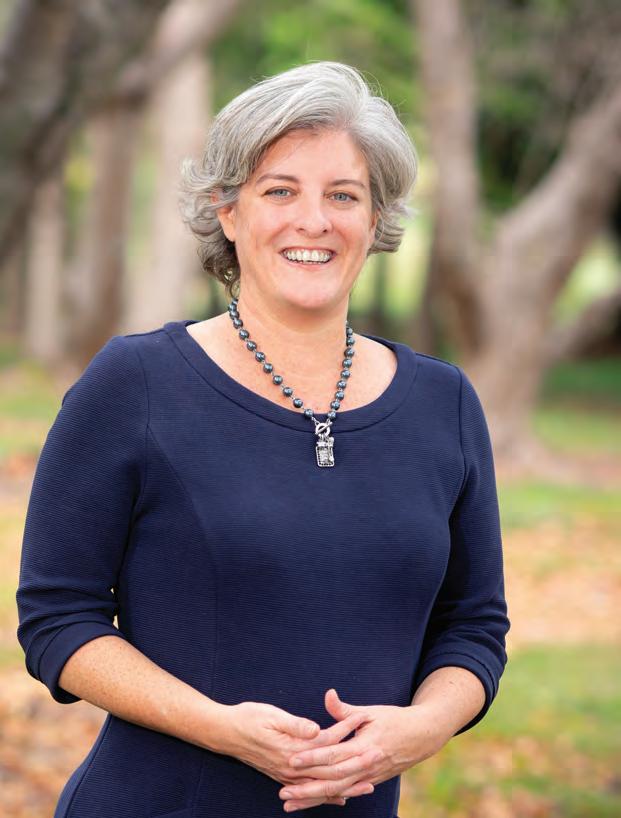
4 minute read
Critical Care, Worlds Away
Critical Care, Worlds Away

Dr. Alison Held Gardner is helping train the next generation of young Kenyan doctors and providing critical care for children across the globe.
By Director of Public Relations Jason Paul Gomez “I’m the doctor that no one wants to see. No one makes plans to see an emergency room pediatrician. There’s a lot of fear involved when I meet patients and their families, but it’s my job to gain trust through their fear.”
The journey taken by Dr. Alison Held Gardner, Purdue, would be considered far from typical. Her path as a pediatric emergency physician began in her earliest years as a young patient and has
taken her to the desolate mountaintops of Kenya – helping families and other physicians provide care for the youngest generation of children. Along the way, Alison has been nurtured in her career and has planted the seeds within others in hopes of creating a better environment for critical care for children around the world.
From the age of six, Alison always knew she would become a physician. She came into the world with two club feet and she underwent many surgeries at Riley Hospital for Children in Indianapolis, Indiana, before she turned five. Though there were no physicians in her family, the care she received at such a young age inspired her to seek out medicine and children as a profession. “When I was young, I always said I wanted to be a doctor for kids, and a firefighter on the weekend,” Alison notes. “Which is funny, as I do actually put out small fires in the ER!”
The path to becoming a M.D. was a driving force throughout her time at Purdue University, and she was supported by her Tri Delta sisters in Gamma Iota Chapter. “Much of my time was dedicated to studying and preparing to take the MCAT (Medical College Admissions Test), so I had to sacrifice a lot of the social aspects of Tri Delta to go after my dreams,” She said. To this day, she still has all the signs her sisters placed around the chapter house saying, “Good Luck, Dr. Alison” and “Congrats Dr. Held!”
Her Tri Delta support system nurtured her in a family atmosphere – which would become an integral part of her practice as a pediatric physician. This support inspired how she works with families as a team to care for a child and walk alongside them at the beginning of their journey of life. Following her pediatric residency, Alison returned for a fellowship to become more specialized in emergency medicine, requiring three more years of education. Her work in the ER allowed her to develop new skill sets.
“For every subset of medicine and disease, there is a pediatric corollary. You have to like to think fast and have a gift to manage and organize chaos.”
The transition to emergency pediatrics also required Alison to make some professional sacrifices. “Part of being in the ER is that you don’t have the gradual relationship building you do with patients and families when in private practice,” Alison said. “Sometimes, in this role you are with parents at a critical junction, and you step into that journey with them on the river of life and help navigate that passage.”

Part of Alison’s own journey as a physician had her following the vital work of colleagues in emergency pediatrics around the world. A former resident colleague had begun a blog about bringing emergency pediatric medicine to Kenya. She felt pulled to the story and passionately followed the blog. An admitted noninternational traveler, she responded to the blog, theoretically, if they could ever use her help to please reach out.
The response came within 15 minutes, “When can you come to Kenya?” She didn’t even really know where in Africa Kenya was located!
Within months, and with the shock and surprise from some family members, Alison was bound for Kijabe, Kenya, with a pediatrics fellow to bring critical care practice to a foreign place. It began with providing daily care to patients, and a well-needed break for local physicians. She has returned every year for the last four years and her work has evolved into teaching opportunities, giving lectures and providing practicum to young Kenyan doctors in pediatrics. She has brought residents and fellows from the United States with her each year to develop the skills for new generations of caregivers to children across the globe.
Most rewarding for Alison on her international journeys is the ability to build advocates and leaders in pediatric medicine. While she has been an advocate for issues like children and gun safety in the U.S., she is unable to do the same for similar issues abroad as she is not a Kenyan citizen. But she has been able to educate young physicians on major issues she witnesses in Kenya like child
abuse. Her encouragement allows them to be the change makers in their country by helping them lobby government and pass laws.
“I myself won’t be the impact in Kenya,” she said, “But the ripple effects are there. These changes will happen for the future generations, long after my work is done.” Just as her own seeds were watered early in her career, she is nurturing the seeds of others to affect change. Her mantra is simple: there are more similarities around the world than there are differences. Mothers far abroad also want their children to be healthy. Understanding the similarities and differences helps combat the epidemic of fear.



